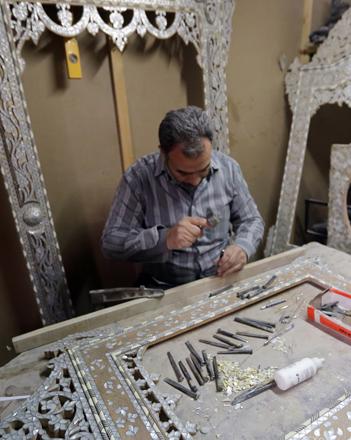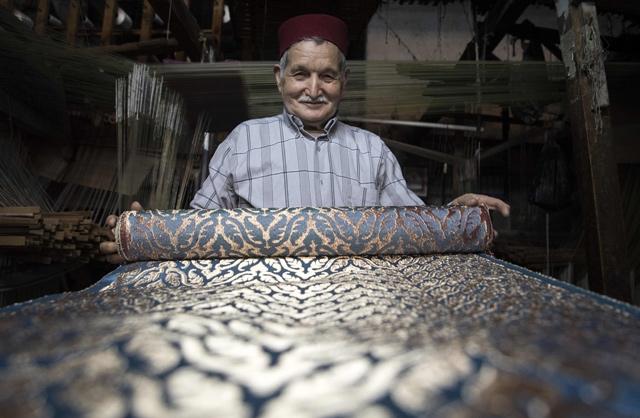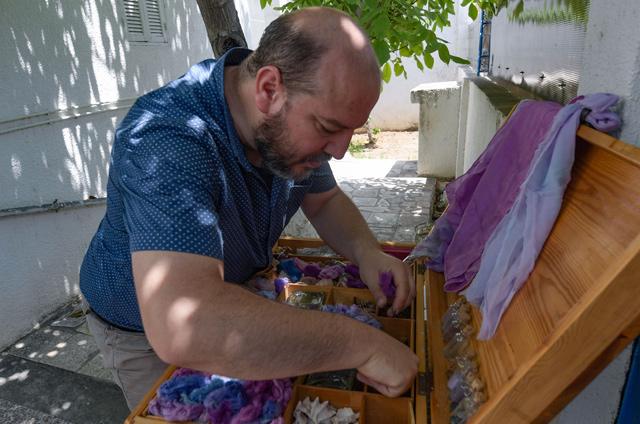You are here
On a Damascus rooftop, tinting silk a fading craft
By AFP - May 21,2018 - Last updated at May 21,2018

Mohammad Al Rihawi dips silk threads into green dye on January 23, at his atelier in the Syrian capital Damascus (AFP photo)
DAMASCUS, Syria — On a rooftop in Syria's capital, Mohammad Al Rihawi plunges silk threads into emerald green dye, preparing it to be woven into the city's famed brocade.
But with civil war raging, he knows it is a dying trade.
"Nobody works in silk dyeing anymore. We must be two or three to do it nationwide," said the 53-year-old, who sports a salt-and-pepper moustache.
But without their ability to cast silk into a range of luminous colours, the brocade Damascus is famous for would cease to exist.
The shimmering fabric, which is the product of hours of work on a wooden loom, is said to have been worn by Britain's Queen Elizabeth II on her wedding day.
Folklore has it that in 1947, Syria's first president, Shukri Al Quwatli, gave a piece of the material to then princess Elizabeth, who included it in her wedding gown.
But civil war has ravaged Syria since 2011, killing more than 350,000 people and forcing more than half the country's population to flee their homes.
The conflict has ripped artisans away from their workshops and kept the tourists away.
"The trade is fighting for its life," said Rihawi, his cheeks flushed with effort as he laboured in his open-air workshop on the roof.
'No more tourists'
"We have no more tourists, no more foreign visitors," said the artisan, who wears a black T-shirt and rubber gloves.
Shielded from the sun by a light tarpaulin sheet, he and his 15-year-old son, Nour, stand on either side of a large cauldron in their boots.
Over a billowing cloud of steam, they rhythmically heave large wooden sticks draped with silk coils up and down over the boiling water.
As he helps his father clean the threads of impurities, Nour, dressed in jeans and with reading glasses, is one of very few eager to take on the craft.
"No one wants to learn the trade anymore. It earns you very little," Rihawi said, a red apron knotted around his waist.
Once rinsed, Rihawi hangs the silk coils up to dry from the ceiling of his small workshop, whose wooden lattice walls let the air and sun through.
Beyond a potted plant, small white plastic tubs of natural pigments — magenta, turquoise, brown, turmeric and sanguine red — sit on a shelf.
Rihawi throws a thimbleful of turquoise and a dash of orange into a pot, and dilutes the colour in a large metal saucepan. Using his hands, he bathes the threads in it.
The final result is a coil of supple silk, turned a brilliant shade of emerald green.
'Swathed in silk'
Before Syria's war broke out with the brutal repression of anti-government protests, Rihawi had a much larger workshop and employed 14 people.
But when clashes reached Ain Terma, a suburb just east of Damascus taken over by rebels in 2012, he sought refuge in the capital.
His former staff have all now either fled the country, or been drafted to serve in the army.
The trade has suffered, especially because fewer and fewer people are buying the silk material it is used for.
"Before the war, I worked every single day of the week," Rihawi said.
"But now, it's sometimes just one or two days a week because of the low demand."
And the silk threads once produced in Syria now come from India or China as the conflict has disrupted silkworm farming at home.
"This craft is like an old man waiting for his death," he said. "But we're doing everything we can to keep it alive."
His day done, Rihawi examines his calloused hands, dyed a bluish-green and worn by years of manual labour.
But he sees the bright side.
"My hands will always be beautiful as long as they are swathed in silk," he said, with a sly smile.
Related Articles
DAMASCUS — In his cramped workshop in Damascus, Mohammad Abdallah delicately etches away at wooden panels inlaid with mother-of-pearl, a cra
FES, Morocco — Abdelkader Ouazzani, the last of Morocco’s brocade master weavers, has been repeating the same gestures for 63 year
TUNIS — A Tunisian man has pieced together bits of a local secret linked to ancient emperors: How to make a prized purple dye using the guts



















